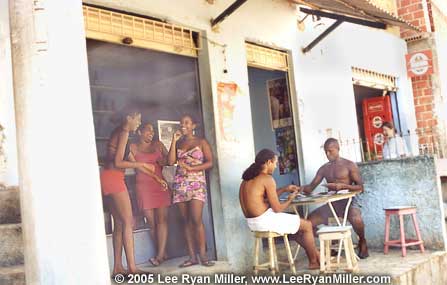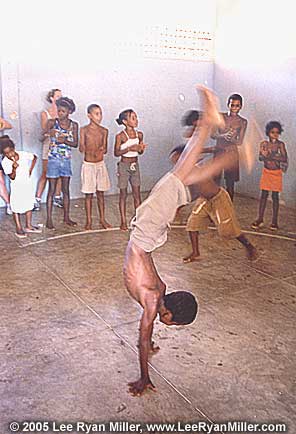|
Brazilians tend not to wear watches or jewelry in public, nor carry wallets, purses, or backpacks. Tomm and Carol warned us never to leave the ship with any items that we could not afford to lose. Despite taking precautions, several students were robbed during our visit to Brazil.
Brazil had just elected a new president, Luiz Ignacio Lula da Silva, popularly known as "Lula." An advocate of social justice and workers' rights, Lula had lost several previous bids for the presidency. Lula finally was successful due to two factors: the rich elite came to the conclusion that deteriorating social conditions were reaching a crisis point (rich people were becoming fearful of leaving their houses), and Lula reached out to the elite to reassure them that he would pursue responsible economic policies if elected.
|

A
café in the Calabar favela, Salvador, Brazil.
|
On February 5, the ship docked in Salvador, Brazil's third largest city, situated on the central coast. After attending a briefing by American diplomats, another professor and I boarded a tour bus with thirty students for a trip to the Calabar
favela.
Our guide explained to us that Calabar is the oldest favela in Salvador, dating from 1913. Although it originally was built on the outskirts of the city, the city has grown around it. It is sandwiched between a rich and a middle class neighborhood. Many of the houses are hooked up to city water and electricity. But the houses were poorly constructed, and the streets were full of trash.
Ironically, favelas often are built by the same people who build the homes of the rich. Construction companies hire poor unskilled workers to build residential and commercial buildings. Those workers usually build shacks on vacant land adjacent to the construction site to house their families. When the job is done, the workers lose their jobs, and continue living in their shacks. Eventually, families move to another location when the husband finds another job, or when developers tear down the favela to build office buildings, shops, or homes for the more affluent.

Children
demonstrating their capoeira
techniques a school in the
Calabar favela, Salvador, Brazil. |
I asked our guide why developers had not razed the favela and built expensive condos like those in adjacent neighborhoods. He explained that the residents of Calabar had an unusually strong community organization, and had organized protests to prevent this.
We spent most of our time at a school. There are no public schools in the
favela, and the members of the community have organized their own. It receives no financial assistance from the government, subsisting on the proceeds from bake sales, donations, and grants from non-governmental organizations.
The director of the school proudly told us that her school accepts all children, no matter how poor. Parents sending their kids to public schools must pay tuition and provide shoes and uniforms. Most of the kids in this school had no shoes. They had no uniforms, and indeed, many of the boys wore no shirts. The children were aged 3 1/2 to 15, but all looked very small. The school, located in a run-down building, had few desks, books, or supplies.
The kids seemed thrilled by our visit. Many of the younger children insisted on holding the hands of the students and professors, and all wanted us to take their pictures. They also put on a performance of
"capoeira," a sort of cross between dance and martial arts. Pairs of kids took turns in a fighting routine of kicks, jumps, and rolls on the concrete floor while others sang and clapped out a rhythm. We presented the director of the school with boxes of school supplies and promised to send the kids copies of the photos we took.
Brazil is a land of great contrasts. Fabulously wealthy people live beside desperately poor people. Brazilians are warm and friendly people, but theft is a way of life, and violent crime is a constant threat. I sincerely hope that President Lula succeeds in his efforts to improve the lives of the poor and to reduce the level of violence in Brazilian society.
 You may navigate the Semester At Sea section using the arrows.
You may navigate the Semester At Sea section using the arrows. 
|




